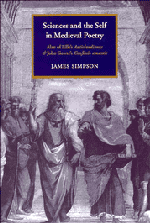 Sciences and the Self in Medieval Poetry
Sciences and the Self in Medieval Poetry Book contents
- Frontmatter
- Contents
- Acknowledgements
- List of abbreviations
- 1 Introduction
- 2 The outer form of the Anticlaudianus
- 3 A preposterous interpretation of the Anticlaudianus
- 4 Alan's philosopher–king
- 5 Ovidian disunity in Gower's Confessio amantis
- 6 Genius's psychological information in Book III
- 7 The primacy of politics in the Confessio amantis
- 8 Poetics
- 9 Conclusion: varieties of humanist politics
- Works cited
- Index
- CAMBRIDGE STUDIES IN MEDIEVAL LITERATURE
7 - The primacy of politics in the Confessio amantis
Published online by Cambridge University Press: 15 December 2009
- Frontmatter
- Contents
- Acknowledgements
- List of abbreviations
- 1 Introduction
- 2 The outer form of the Anticlaudianus
- 3 A preposterous interpretation of the Anticlaudianus
- 4 Alan's philosopher–king
- 5 Ovidian disunity in Gower's Confessio amantis
- 6 Genius's psychological information in Book III
- 7 The primacy of politics in the Confessio amantis
- 8 Poetics
- 9 Conclusion: varieties of humanist politics
- Works cited
- Index
- CAMBRIDGE STUDIES IN MEDIEVAL LITERATURE
Summary
INTRODUCTION
In Book VII of Confessio amantis Genius recounts the parts of philosophy to Amans, the second element of which is Rhetoric. Words are the most powerful amongst earthly things, and they should, accordingly, be truthful:
For if the wordes semen goode
And ben wel spoke at mannes Ere,
Whan that ther is no trouthe there,
Thei don fulofte gret deceipte;
For whan the word to the conceipte
Descordeth in so double a wise,
Such Rethorique is to despise
In every place, and forto drede.
(vii. 1550–7)But if plain, unequivocal speech is recommended to a king here, it is clear that Gower's larger sense of persuasive discourse cannot be summarized so simply. For in the model of the poem which I have suggested in the last two chapters, we can see how verbal strategy must be characterized by a good deal of ‘double speche’ (vil.1733). The whole poem, I have been arguing, is generated out of fundamental incongruences and indirections, which are particularly pronounced in the figure of Genius. Once we understand the psychological status of Genius, we realize that his claim to authority over Amans cannot be accepted without qualification: he is, after all, Amans's genius, the very imaginative faculty which feeds the concupiscent will, with which he is so closely associated. But, we have observed, his potential allegiances are also wider, through his connection with the reason.
- Type
- Chapter
- Information
- Sciences and the Self in Medieval PoetryAlan of Lille's Anticlaudianus and John Gower's Confessio Amantis, pp. 198 - 229Publisher: Cambridge University PressPrint publication year: 1995


